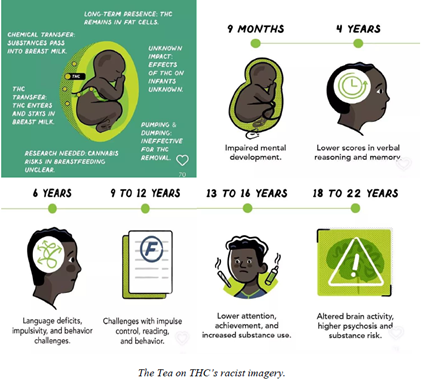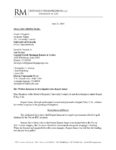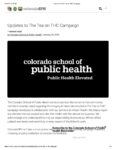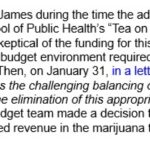About This Case:
For the last year, our client Regent Wanda James has put her name, title, and reputation on the line to stand up against a racist program pushed by the University of Colorado.
This fight started in December 2024, when the Colorado School of Public Health rolled out the “Tea on THC” campaign. Although it was billed as a anti-marijuana campaign, those in charge of the campaign replaced science with racist imagery, depicting Black parents as drug users, and their babies, children, teenagers as “[i]mpaired mental[ly]” achieving “[l]ower scores in verbal reasoning and memory,” exhibiting “[l]anguage deficits, impulsivity, and behavior challenges,” and having “[c]hallenges with impulse control, reading, and behavior.”

Rather than let this repugnant campaign stain the University’s reputation and alienate Black students, Regent James jumped into action. She contacted University leaders including the University President and CU Boulder Chancellor and asked them to join her mission to get the racist campaign suspended. See Ex. 1, Regent James Letter to Investigators, p. 8. But these administrators brushed Regent James off. Id.
Unwilling to give up, Regent James contacted the governor’s office and asked why the state was funding this racist program. Id. at pp. 9–10. The governor’s office told Regent James that the state had already decided to pull the program’s funding to help address a budget shortfall.
In the face of public uproar, the University began to acknowledge Regent James’s concerns. They pulled the Tea on THC images and issued a formal apology for the racist content. See Ex. 2, CSPE Apology. That should have been the end of this.
But the other members of the Board of Regents were infuriated that Regent James called out the University for being racist, so they triggered a sham investigation into Regent James, claiming that by calling out racism, she might have violated various Regent policies.
Regent James approached this process head-on. She even requested to sit for an interview with the investigators, requested to record the interview, and provided nearly two hours of testimony on every question the investigators asked. A copy of the audio from that interview is available on this page. See Exs. 3–4, James Interview (Parts 1 & 2).
In the end, the investigators rejected the most serious charges against Regent James, holding that she had no conflict of interest, and she did not interfere with academic freedom.
Boxed in, her follow members of the Board of Regents focused on more amorphous rules. In the end, they voted to censure and sanction Regent James because they believed she violated her “fiduciary duties.” Their theory is that it is always a violation of fiduciary duties for a regent to advocate against funding any University program. Nonsense.
Advocating against funding a University program can be (and in this case was) in the University’s best interests. Under the Board of Regents theory, regents would be forbidden from advocating against funding a campaign that stated Black students are intellectually inferior because of their skull shape. Regents would be forbidden from advocating against funding a campaign that stated gay students are amoral and therefore shouldn’t hold positions of trust in student groups. Regents would be forbidden from advocating against funding a campaign that stated that Muslims are biologically more violent than their Christian counterparts. Regents have an obligation and right to take stands against programs that are repugnant to the University’s values and mission, reflect poorly on the institution, and alienate already marginalized members of our community.
Regent James had a constitutional right to oppose this bigoted campaign. The First Amendment guarantees Regent James the right to speak her mind without fear of government retaliation.
Government officials, community leaders, legal scholars, and the University community immediately recognized that the Board of Regents’ actions were indefensible and unlawful.
Attorney General Phil Weiser criticized the Board of Regents for punishing Regent James’s speech, and robbing CD1 of representation.

Tweets from Attorney General Phil Weiser criticizing the Board of Regents’ Censure and Sanction of Regent James
And Governor Polis made clear that the Board of Regents’ theory had no basis in fact, and noted that he too was “made aware of the deeply insensitive images . . . and was disturbed that CU was administering such an insensitive campaign.” Ex. 5, Letter from Governor Polis. This is in addition to a chorus other prominent members of the Colorado community that supported Regent James and condemned the imagery, including former Speaker of the House Terrance Carroll, Colorado Black Democrats, Chair of the Colorado Democratic Party Shad Murib.
Regent James could have put her interests first and sued the University to undo their unlawful censure and sanction. But the other members of the Board of Regents had already spent $500,000 on legal fees to target her—funds that could have been used to fund student programs. And she did not want her colleagues to run up an even higher bill on the students’ dime. Instead, Regent James turned her attention back to the work, fighting for higher education that is more affordable to all Coloradans, including rural, poor, and marginalized Coloradans.
Regent Wanda James has never been afraid to strike out ahead of the pack. She was the first Black woman commissioned as an officer through CU Boulder’s Naval ROTC Battalion. She was the first Black woman in the entire country to own a cannabis dispensary. And she was the first Black woman in decades to be elected Regent of the University of Colorado.
So if she must be the first person to be censured and sanctioned by the University for opposing a racist program, so be it. To be a change maker, you have to be willing to stand apart from the pack. We were proud to represent her in her fight on behalf of the University’s Black professors, staff, alumni, and students.




